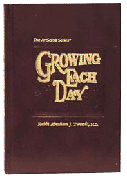An atheist once visited a well known rabbi and demanded that the rabbi prove to him the existence of God. In silence, the rabbi refused…and the atheist got up to leave, in anger. But as he left the rabbi called out, ‘But can you be sure there is no God?’ The atheist wrote, years later, ‘I am still an atheist, but that question has haunted me every day of my life.’
Such is the soul hunger of the intellectuals who would believe in God, if only someone could overwhelmingly convince them; if only someone could demonstrate the undeniable truth of God...
That, then, is the ugly, broad ditch which I cannot get across, however often and however earnestly I have tried to make the leap. If anyone can help me over it, let him do it, I beg him, I adjure him. He will deserve a divine reward from me.
What pain in his voice! What honesty of heart!
Basically Lessing is asking the same thing that the atheist asked the rabbi: ‘Can you prove God to me?’ ‘Can you prove to me the Son of God?’
It is a heartrending question. Can any answer be found?
I believe there is a simple answer. Not an easy answer, mind you, but one at once clear and profound: so simple a child could follow it, yet so hard that few adults will take the path.
Two great thinkers, and two great believers, Pascal and Dosteovsky, both wrestled with this question. And, though separated by vast years and contexts, both came up with the same answer. There is much logic behind this answer [in the case of Pascal] and much life behind it [in the case of Dosteovsky], but the answer can be given in one sentence. Here is the answer:
If you would like to know if God exists, then begin living your life exactly as you would live it if you knew God existed.
That is what I would have told the atheist, had I been the rabbi.
That is what I would have told Lessing, had I been alive to hear him.
There is only one way across the ‘ugly ditch’ that Lessing saw. And that is the undeniable relational encounter with the God of the universe. In other words, the answer to the atheist, and the answer to Lessing, is not first an intellectual answer, but a relational one.
Do you want to believe in God?
Then begin living toward God. At some point, the lived prayer will bring such overpowering light that the universe will be seen for what it is, morally, spiritually, and yes, intellectually!
There is great logic behind this simple answer. There is compelling reason.
If you are one of the searchers, or know someone searching, who would like to explore the reasoning behind this solution, then email me, and I will gladly dialogue.
But this is the answer, without any of the math behind it.
I sensed that I should write it tonight. May God bless it to someone’s life.
In Grace,
Loy


